
A Woman Under the Influence is a 1974 American drama film written and directed by John Cassavetes. The story follows a woman whose unusual behavior leads to conflict with her blue-collar husband and family. It received two Academy Award nominations, for Best Actress and Best Director.

Alice Doesn't Live Here Anymore is a 1974 American romantic comedy drama film directed by Martin Scorsese and written by Robert Getchell. It stars Ellen Burstyn as a widow who travels with her preteen son across the Southwestern United States in search of a better life. Kris Kristofferson, Billy "Green" Bush, Diane Ladd, Valerie Curtin, Lelia Goldoni, Vic Tayback, Jodie Foster, Alfred Lutter, and Harvey Keitel appear in supporting roles.

John Nicholas Cassavetes was a Greek-American filmmaker and actor. He began as an actor in film and television before helping to pioneer modern American independent cinema as a writer and director, often producing and distributing his films with his own money. He received nominations for three Academy Awards, two BAFTA Awards, four Golden Globe Awards, and an Emmy Award.

Faces is a 1968 American drama film written and directed by John Cassavetes. It stars John Marley, Gena Rowlands, Lynn Carlin, Seymour Cassel, Fred Draper, and Val Avery.

Quintet is a 1979 American post-apocalyptic science fiction film directed by Robert Altman. It stars Paul Newman, Brigitte Fossey, Bibi Andersson, Fernando Rey, Vittorio Gassman and Nina Van Pallandt.

Day for Night is a 1973 romantic comedy-drama film co-written and directed by François Truffaut. The metafictional and self-reflexive film chronicles the troubled production of a melodrama, and the various personal and professional challenges of the cast and crew. It stars Jacqueline Bisset, Valentina Cortese, Jean-Pierre Aumont, Dani, Alexandra Stewart, Jean-Pierre Léaud and Truffaut himself.

Funny Lady is a 1975 American biographical musical comedy-drama film and the sequel to the 1968 film Funny Girl. The film stars Barbra Streisand, James Caan, Omar Sharif, Roddy McDowall and Ben Vereen.
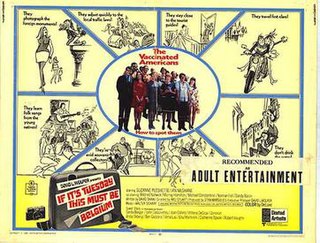
If It's Tuesday, This Must Be Belgium is a 1969 American romantic comedy film made by Wolper Pictures and released by United Artists and made in DeLuxe Color. Directed by Mel Stuart, the movie was filmed on location throughout Europe, and featured cameo appearances. The film stars Suzanne Pleshette, Ian McShane, Mildred Natwick, Murray Hamilton, Sandy Baron, Michael Constantine, Norman Fell, Peggy Cass, Marty Ingels, Pamela Britton, and Reva Rose.
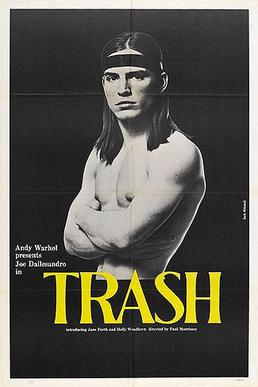
Trash is a 1970 American drama film directed and written by Paul Morrissey and starring Joe Dallesandro, Holly Woodlawn and Jane Forth. Dallesandro had previously starred in several other Andy Warhol/Paul Morrissey films such as The Loves of Ondine, Lonesome Cowboys, San Diego Surf, and Flesh.

She's So Lovely is a 1997 American romantic drama film directed by Nick Cassavetes, written by John Cassavetes. At the time of its release, it received special attention because, eight years after his death, it was the first posthumous film to feature previously unreleased material from John Cassavetes. The film stars Sean Penn and John Travolta as the respective male leads of whom bid for the affection of Maureen Murphy Quinn. Harry Dean Stanton co-stars as a friend of Penn's character, and James Gandolfini plays the abusive neighbor.

The Killing of a Chinese Bookie is a 1976 American neo-noir crime film written and directed by John Cassavetes and starring Ben Gazzara. A rough and gritty film, this is the second of their three collaborations, following Husbands and preceding Opening Night. Timothy Carey, Seymour Cassel, Morgan Woodward, Meade Roberts, and Azizi Johari appear in supporting roles.
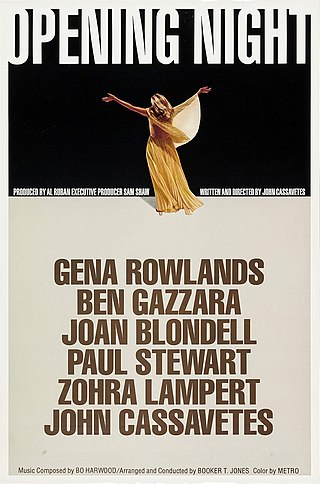
Opening Night is a 1977 American psychological drama film written and directed by John Cassavetes, and starring Gena Rowlands, Ben Gazzara, Joan Blondell, Paul Stewart, Zohra Lampert, and Cassavetes. Its plot follows a stage actress who, after witnessing the accidental death of one of her fans, is haunted by a recurring apparition of the deceased woman, spurring a nervous breakdown while she prepares for the premiere of a Broadway play.

Patty Hearst is a 1988 American biographical crime drama film directed by Paul Schrader. The film stars Natasha Richardson as Hearst Corporation heiress Patricia Hearst and Ving Rhames as Symbionese Liberation Army leader Cinque. It is based on Hearst's 1982 autobiography Every Secret Thing, which was later rereleased as Patty Hearst – Her Own Story.

The Fury is a 1978 American supernatural horror thriller film directed by Brian De Palma and starring Kirk Douglas, John Cassavetes, Amy Irving, Carrie Snodgress, Charles Durning, and Andrew Stevens. The screenplay by John Farris was based on his 1976 novel of the same name.

Mikey and Nicky is a 1976 American crime drama film written and directed by Elaine May. It stars John Cassavetes as a desperate small-time mobster and Peter Falk as his longtime, childhood friend. The supporting cast features Ned Beatty, Carol Grace, Rosee Arrick, and noted acting teacher Sanford Meisner.

Mrs. Soffel is a 1984 American drama film directed by Gillian Armstrong, starring Diane Keaton and Mel Gibson and based on the story of condemned brothers Jack and Ed Biddle, who escaped prison with the aid of Kate Soffel, the warden's wife.

Tempest is a 1982 American adventure comedy-drama romance film directed by Paul Mazursky. It is a loosely based, modern-day adaptation of the William Shakespeare play The Tempest. The picture features John Cassavetes, Gena Rowlands, Susan Sarandon, Raúl Juliá and Molly Ringwald in her feature film debut.
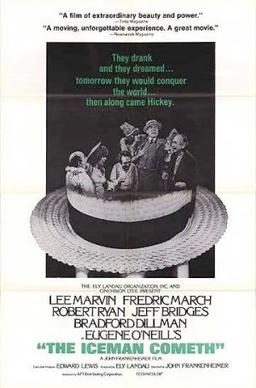
The Iceman Cometh is a 1973 American drama film directed by John Frankenheimer. The screenplay, written by Thomas Quinn Curtiss, is based on Eugene O'Neill's 1946 play of the same name. The film was produced by Ely Landau for the American Film Theatre, which from 1973 to 1975 presented thirteen film adaptations of noted plays.
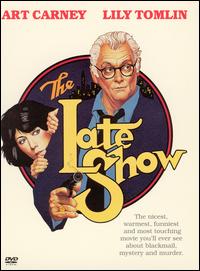
The Late Show is a 1977 American neo-noir mystery film written and directed by Robert Benton and produced by Robert Altman. It stars Art Carney, Lily Tomlin, Bill Macy, Eugene Roche, and Joanna Cassidy.



















